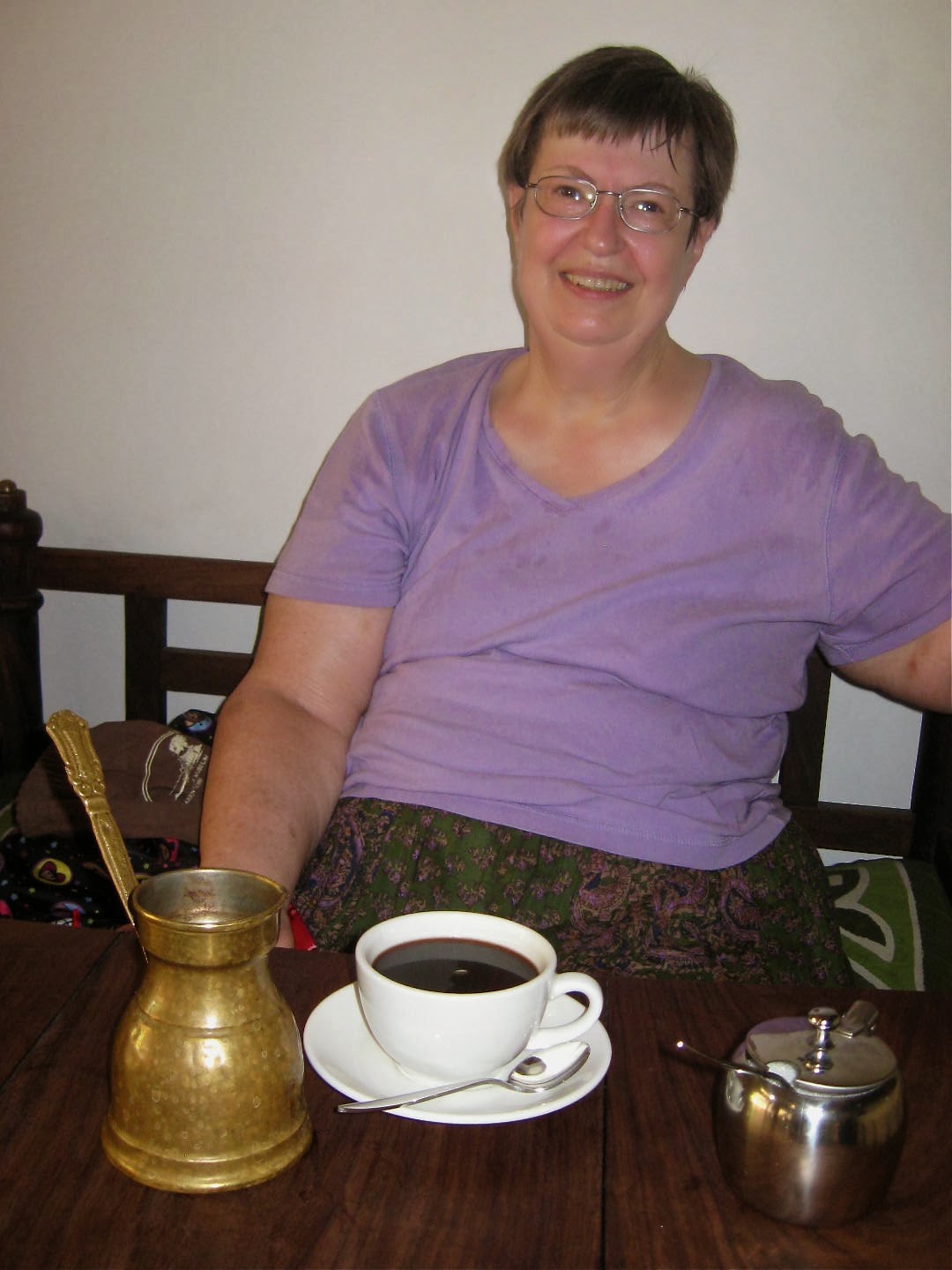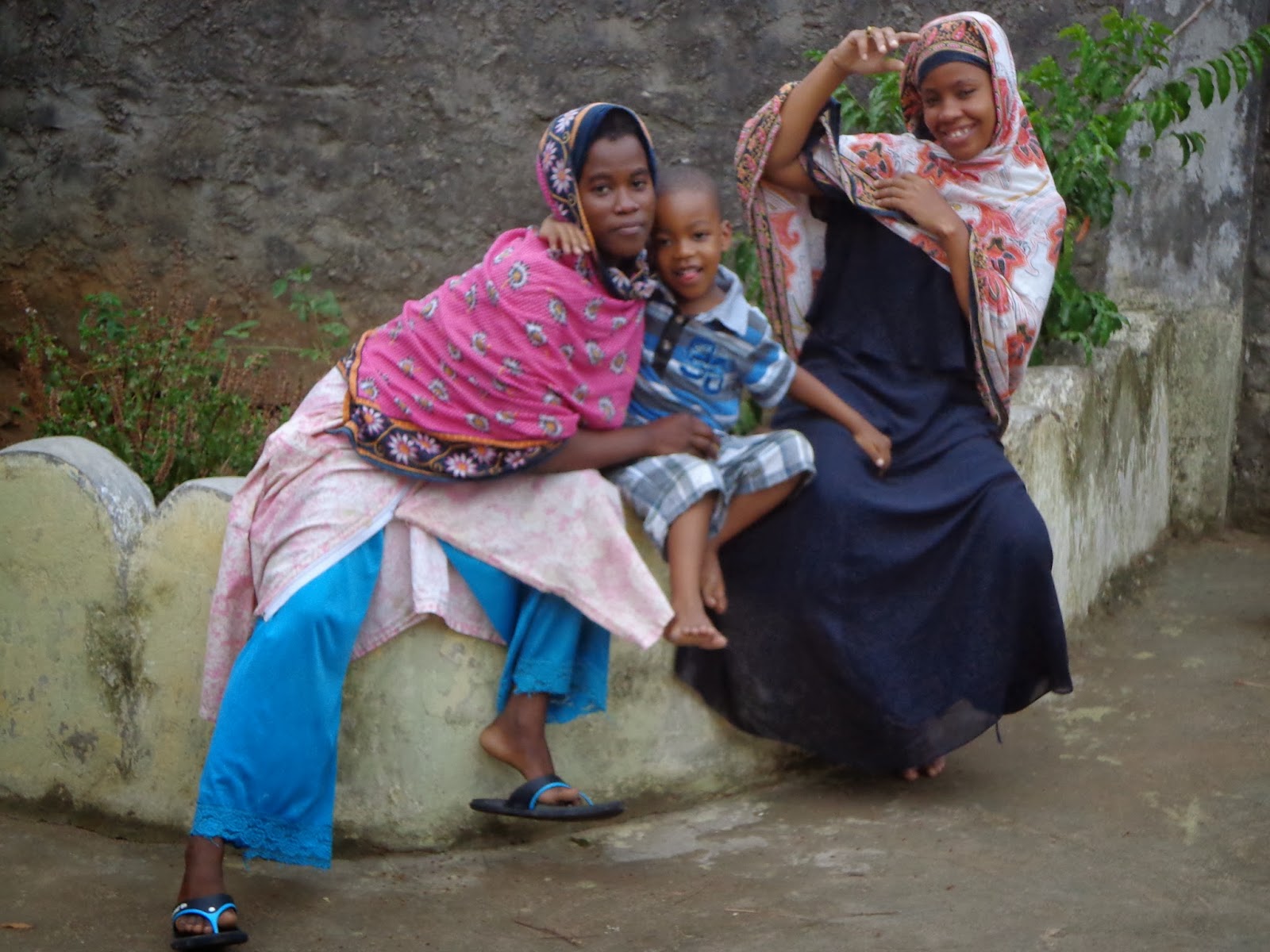On Saturday, everyone finished packing up, saying good-by to their host families, and then converged at Kundayo, where a bus came to pick us up at 3:30 p.m. I was very grateful that all the students were well, and that all seemed eager to travel to a very different place. I did regret, however, that because we were flying in the early evening, it would be dark when we flew that last part of the way. During the day, one can see many small islands and small boats in the aquamarine water between the mainland and Zanzibar. When we arrived, only the lights of Stone Town and the surrounding city were visible.
 |
| On the bus for the airport. |
The first sensation on leaving the plane was the wet wall of heat. Here instead of a wind chill factor, they have a "real feel" temperature chart. So, even though the temperature may be only 91º, the real feel is 102º. Lucky for us, the temperature may dip down to a cool 87º at night. The humidity, though, never seems to decrease, so here one does not perspire, one sweats like a swamp toad. It's difficult to behave in a lady-like fashion when one has rivulets of sweat pouring into one's ears and eyes.
At the airport, I was met by our hostess in 2012, Fadhila, and her small children. As we left customs, but were still in a secure area, I heard shouts of "Janet! Janet!" and saw the three little girls streak past the security guards to come bury me and John in a huge group hug. None of the airport personnel made a move to stop them, so we walked out of the airport all together to where Fadhila and little Shehe were waiting. Fadhila shrieked and hugged me too, and Shehe, who can talk now, said "hello" in English. The professors from SUZA were also there to greet us and all the students. John's and my luggage was loaded into Fadhila's, car and I went directly to her house from the airport.
 |
| Welcome balloons on our door. |
Meanwhile, the students and their luggage were loaded into a bus from the State University of Zanzibar (SUZA), and they were driven into the city to meet their new host mothers. John and Megan were with them, but I was not, so I missed the fun of seeing the black clad Muslim women welcome their very American guests. I must say though that our students have been absolutely stellar in how they dress, so I am confident that they will make a smooth adjustment to the culture here.
On Sunday, everyone had a free day. After lunch, John and I took a daladala into town and spent some time just getting re-acquainted with Stone Town. We saw two of our students sitting in the shade drinking some local juice concoction with two other students, one from Tulane and one from Indiana University's Flagship program. Obviously, we are not the only American students in town right now, but I hope we are the best behaved. The local professors have told us horror stories about the behavior of some other groups.
As usual, John and I got lost and had arguments about which way to go in the narrow maze of streets that twist and turn in every surprising ways. By the time we finally got to the edge of Stone Town, near the shore, I was ready to lie down and die from heat and thirst. John asked a soldier where the Post Office was, and after another 10 minutes of plodding on, we made it to Kenyatta Street, the heart of the tourist area, and the one store which I knew for certain has air-conditioning, Memories. It took me at least 5 minutes to cool down enough to do a credible job of pretend shopping. In 2012, I was charmed by the merchandise, but this time, I didn't see a single item that tempted me. Worst of all, the selection of spices was diminished, and there was not a single packet of turmeric on the shelves. I'll need to find out if there is a current turmeric shortage or if this was just a temporary glitch in inventory.
Once I had cooled down enough to function more normally again, we walked up the street a very short distance to the Stone Town Cafe, a place we had enjoyed often in 2012 even though it is a very obvious tourist spot. It's a wonderful place to people watch, and their fruit and muesli mix is superb.
After we had each drunk a litre of water each, John ordered a Stoney and I a pot of coffee. The coffee comes in a long-handled brass pitcher and is almost as thick as thin custard. It is definitely some of the best coffee in the world and costs only $2 for a pot of 3+ cups. I enjoyed every sip right down to the dark brown sludge at the bottom of my cup.

Friday evening, once both John and I were here at Fadhila's house, she fed us a dinner of fish soup, potato croquettes, and bread. She also had made some incredible juice from mangoes, avocados, and lemons. Then, yesterday for breakfast, we had fruit--mangoes and pineapple--an omelet, and imitation Laughing Cow cheese, and bufflo bread, a local type of loaf. The largest meal is around 1:00p.m., and we had roasted chicken, chipatis, cabbage and cucumber salad, and French fries (chips). The final meal of the day is ofter served as late as 9:00 p.m. and was chicken spinach soup, mandazi (deep fried dough), bread and watermelon. In the late afternoon, perhaps around 4:00, the children bring us tea or juice and some sort of sweet treat such as a muffin or peanut candy.
The first thing the children wanted me to do was sit at the table and help them with their homework. I had done that in 2012, and they were eager to sit with me and have me go over their lessons with them. They are very smart little girls, but some much of their lessons are simply rote learning without any explanation of what things actually mean. last evening Aisha was drawing topographical charts, but she had no idea of what they meant in reality--what a summit, pass, or saddle looked like in three dimensions. John tried to show her using upside down cups for mountains, and I kept thinking how much a bit of paper mache would help. Ahlam was studying parts of the body and their functions, e.g. our eyelids protect our eyes from dirt and the sun, and I learned that our hair provides the friction necessary to keep things that we carry on our heads from falling off. Ammal didn't have any homework, so I taught her the difference between hair and fur, paws and hands, fingernails and claws, etc.
 |
| Homework with Ammal |
 |
| Aisha and Ahlam doing homework. |
|
Amin, the eldest, is 18 now and seems to be a huge animal lover. His dog, Ninja, had a litter of puppies a short while ago, but now all but one have been given away or traded for something. Yesterday, Amin traded the last male puppy for an adult dog he wanted, so now he has three adults and one puppy. The new dog was kenneled right outside our window and barked a lot in the night, so we got very little sleep. Amin also has a tiny little monkey that loves to cuddle on his shoulder. Fadhila told us sheepishly that the monkey is named "Winn" after Winnie Mandela. I guess Amin got the monkey during the time Mandela's death and funeral dominated the news.
 |
| Amin with his puppies |
Hamad, Fadhila's husband, was here for the weekend. He works as an electrical engineer on the mainland all week, so we never see much of him. His English is very fluent, and he's always very congenial, but I feel that he tolerates us as Fadhila's hobby more than as a welcoming host. That may be a bit of a misperception though since as a Muslim male he would feel less familial with me than a western host would. This morning, Fadhila took Hamed to the port to catch a ferry back to Dar es Salaam, so I have been here alone with the dadas all morning. There are now three new dadas, but I haven't learned their names perfectly yet.
This morning, John got up earlier than I, and after breakfast, he took a daladala to SUZA to be there when the students came for classes at 8:00. Normally, the Swahili classes will run from 8:00 a.m. to 12:00 noon, but today may be different, as everyone is taking a placement exam. Even John and Megan plan on attending classes, but Megan's will be a much higher level than any others' since she has already had extensive Swahili study. John's Swahili has improved some since 2012, but there are students who are stronger than he is now. I remain the sluggard who would much rather read books on her Kindle than sit for 4 hours in a bare dusty classroom, trying to learn a language I didn't master well the first time I studied it at the University of Wisconsin in 1972.
During the night, the barking dog and heat kept me from sleeping well, so I finally got up and tried to get on the internet to see what I could of the Super Bowl. It was just about halftime, and I was stunned at the Seahawks' lead. I could not get into FOX's live streaming, but I found CNN's almost up-to-the-minute videos of the big plays and was able to keep current that way. John had gone back to sleep once he heard the halftime score, but I stayed somewhat awake until the very end. What an incredible game! Now, today, I am only semi-conscious and will need to take a nap this afternoon.
















































